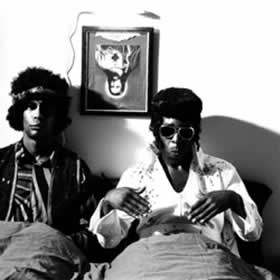 Two interlaced stories about hero worship and fatherhood echo one another in Nigerian/UK filmmaker Kevin Aduaka’s striking debut ELVIS PELVIS.
Two interlaced stories about hero worship and fatherhood echo one another in Nigerian/UK filmmaker Kevin Aduaka’s striking debut ELVIS PELVIS.
Elvis Pelvis is a story told in two parts; “THE SUIT” tells of a family living in London in the early 80s and the effects of the legacy of Elvis Presley on them. Ten-year-old Elvis lives under the tyranny of his father Tony—a stern policeman who is obsessed with the legacy of Elvis Presley. Elvis’s walls, in contrast, are covered with a shrine to Jimi Hendrix. “THE MESSIAH” takes place 17 years later and tells of Derek, a disturbed recluse who also loves Hendrix, and pretends to be the long-lost son of a dying patriarch. He seeks to distract himself by visiting the local church in search of salvation.
Graceful filmmaking, strong performances and musical allegories combine to create a profoundly sensual journey, visceral in its effect on the viewer. Director Aduaka is firmly at the helm of this original film that unfolds with sharp insight and dramatic flair.
Kevin Aduaka was born October 7, 1972 in Lagos, Nigeria and moved to England in 1993 to study engineering. He soon acquired a taste for photography – and left the engineering course uncompleted in favour of study in photography, his interest drifted towards film; he discovered and fell in love with Cinema: Swedish cinema, German expressionism, Italian neo-realism, Japanese Cinema, Russian Cinema, French New Wave, and late 60s – mid 70s American independent Cinema. Aduaka enrolled to study film and visual art at the Central Saint Martins School of Arts, London. He is also a lover of Jazz music, and admires the improvisational nature of Bebop. ‘I strive to make cinema that feels like what Charlie Parker and John Coltrane were doing with their saxophones in the late 1940s & 1950s and the 1960s, respectively. The sense of freedom they demonstrated seems to be absent today in any medium of Art.’
He soon acquired a taste for photography – and left the engineering course uncompleted in favour of study in photography, his interest drifted towards film; he discovered and fell in love with Cinema: Swedish cinema, German expressionism, Italian neo-realism, Japanese Cinema, Russian Cinema, French New Wave, and late 60s – mid 70s American independent Cinema. Aduaka enrolled to study film and visual art at the Central Saint Martins School of Arts, London. He is also a lover of Jazz music, and admires the improvisational nature of Bebop. ‘I strive to make cinema that feels like what Charlie Parker and John Coltrane were doing with their saxophones in the late 1940s & 1950s and the 1960s, respectively. The sense of freedom they demonstrated seems to be absent today in any medium of Art.’
ELVIS PELVIS, Kevin Aduaka’s first feature film premiered at the 2007 Berlin International Film Festival – where it competed for the Best First Feature Film Award
Cinema Without Borders: Please tell us about yourself and your background?
Kevin Aduaka: DVD of my Film “Elvis Pelvis” has been released on May 2, 2012 by Amazon and its instant video streaming is now available on amazon.com
 CWB: What motivated you to make “Elvis Pelvis”?
CWB: What motivated you to make “Elvis Pelvis”?
Kevin: I was thinking a lot about power and its misuse, I mean, power in its wider global manifestation – with a focus on America its effect on the rest of the world. Then I had an idea of demonstrating this through a family unit; in particular – a father and a son. In a sense the film is a depiction of ideas of power and identity in their simpler form.
CWB: What is “Elvis Pelvis” about?
Kevin: It is basically about a father who is so obsessed with Elvis Presley, he tries to fashion his, Elvis- Presley-hating son, Elvis after his icon. I guess it is a film about power and rebellion on another level.
CWB: How challenging was making this film?
Kevin: It was very challenging, both artistically and financially. We had quite a lot of people back out of financing the project as their impression was that I was too fixed on my vision for the film. This led us to complete the film on our own – independently, which I think the film merits from.
CWB: How did you work with the actors? Were they professional actors?
Kevin: Yes, they are professional actors that we found through a casting director. I don’t really believe in actors reading scri pts at rehearsals, when there are rehearsals. What I tended to do was to try to get to know the actors and discover their strengths and weaknesses somehow, then attempt to shape the material around them, to a degree. It was a sort of organic way of working, and in a sense you get some authenticity and truth in their performances, if you call their performances, performances.
rehearsals. What I tended to do was to try to get to know the actors and discover their strengths and weaknesses somehow, then attempt to shape the material around them, to a degree. It was a sort of organic way of working, and in a sense you get some authenticity and truth in their performances, if you call their performances, performances.
CWB: How did you come up with the visual style of the film?
Kevin: The visual style of the film came from the idea. The idea was to make something memorable, something quite involving to look at. I was trying to make something extreme, in a sense – to enforce my dissatisfaction with ‘middle of the road’ narrative filmmaking. I wanted the film to demand most of the senses of the audience – and to be experienced on so many levels – and not just watched and swallowed. I really believe that an audience’s aesthetic connection to a film is as, if not more, important, as its narrative connection to the film. I am constantly trying to find new ways of presenting narrative for the Cinema – other possibilities. I guess this is my battle.
CWB: What is your next project?
Kevin: I am working on a project at the moment, but I’d rather not divulge right now, as its still in its early stage.
 CWB: Have any audiences seen “Elvis Pelvis”? If they have what have been their reactions?
CWB: Have any audiences seen “Elvis Pelvis”? If they have what have been their reactions?
Kevin: “Elvis Pelvis” Premiered at the Berlin film festival in February of 2007 and there was quite a buzz around the film, and the audience received it very well. At its final screening in Berlin, the theatre was so packed out they had to turn people away at the doors. And I think health and safety laws were seriously infringed that night as some members of the audience were forced to occupy the stairway and the aisles (fire exits). I was really shocked at the scenes that night. When the film ended, you could hear a pin drop, then suddenly a rapturous applaud filled the theatre. So yeah, the reaction was favourable from the audience.
CWB: Who are your favorite filmmakers? What is the very first movie that you remember that had a great affect on you?
Kevin: That is a very broad question because I have so many films and filmmakers in my mental bank of cinema that influence me. For example, I am inspired by German expressionism, Italian New Realism, French New Wave amongst many. I am also inspired by earlier American independent films and filmmakers of the sixties and seventies like John Cassavetes. There are contemporary filmmakers following in that path, filmmakers like Jim Jarmusch, people who aren’t afraid to make films about what they truly and personally think is important, and what they really care about – whatever that may be.

